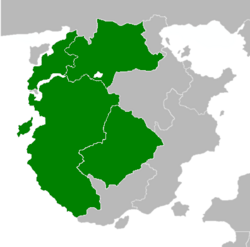WCIGF: Difference between revisions
| (5 intermediate revisions by 2 users not shown) | |||
| Line 13: | Line 13: | ||
| formation = 2034 | | formation = 2034 | ||
| founding_location = Port St. Charles, [[New Harren]] | | founding_location = Port St. Charles, [[New Harren]] | ||
| membership = | | membership = {{flag|Caldera}}<br>{{flag|Canespa}}<br>{{flag|Caracua}}<br>{{flag|Netansett}} | ||
| languages = {{hlist|Ænglish|Volin|Papasimi|Ashkenauk|Malkn|Quonish}} | | languages = {{hlist|Ænglish|Volin|Papasimi|Ashkenauk|Malkn|Quonish}} | ||
}} | }} | ||
The '''West Cusinaut Infrastructure Group Fund''' ('''WCIGF'''), sometimes referred to as simply the '''Cusinaut Infrastructure Group''' ('''CIG'''), is a supranational agency composed of | The '''West Cusinaut Infrastructure Group Fund''' ('''WCIGF'''), sometimes referred to as simply the '''Cusinaut Infrastructure Group''' ('''CIG'''), is a supranational agency composed of 4 member states. Established in the aftermath of [[Cusinaut|Cusinautic]] diplomatic disputes, the agency was created by the [[Treaty of Port St. Charles]] signed in [[New Harren]] in 2034, and was meant to develop Cusinaut, especially West Cusinaut, as well as make the subcontinent self reliant. The WCIGF operates exclusively in the West Cusinaut Developmental Area, and determines which forms of grants and funds these nations receive for projects. The WCIGF is governed by a board of representatives from each of its 4 states, with very little oversight from its 5 temporary contributors. The WCIGF is also recommended many actions by the West Cusinaut Economic Integration Board, which has its own board of representatives from each signatory nation. The WCIGF is one of the key pieces of the [[Caroline treaty system]]. | ||
=== Temporary Contributors === | === Temporary Contributors === | ||
| Line 55: | Line 55: | ||
|colspan="2" |25 | |colspan="2" |25 | ||
|colspan="2" |25 | |colspan="2" |25 | ||
|- | |- | ||
!{{Flag|Caldera}} | !{{Flag|Caldera}} | ||
| Line 76: | Line 66: | ||
| | | | ||
|- | |- | ||
! | !{{Flag|Canespa}} | ||
| | |29 | ||
|Makuahine-Sirkup Tunnel, uniting Caldera and Canespa | |19 to Makuahine-Sirkup Tunnel, uniting Caldera and Canespa | ||
10 to port reformation | |||
| | | | ||
| | | | ||
| Line 95: | Line 77: | ||
| | | | ||
|- | |- | ||
!{{Flag| | !{{Flag|Caracua}} | ||
| | | | ||
| | | | ||
| Line 128: | Line 110: | ||
=== West Cusinaut Railway === | === West Cusinaut Railway === | ||
=== | === Caracua and Maloka Modernization and General Infrastructure Fund === | ||
Latest revision as of 10:09, 23 July 2024
This article is a work-in-progress because it is incomplete and pending further input from an author. Note: The contents of this article are not considered canonical and may be inaccurate. Please comment on this article's talk page to share your input, comments and questions. |
West Cusinaut Infrastructure Group Fund | |
Flag of the WCIGF | |
 Member states of the WCIGF shown in green | |
| Abbreviation | WCIGF or CIG |
|---|---|
| Nickname | Cusinaut Infrastructure Group |
| Formation | 2034 |
| Founded at | Port St. Charles, New Harren |
Membership | |
Official languages |
|
The West Cusinaut Infrastructure Group Fund (WCIGF), sometimes referred to as simply the Cusinaut Infrastructure Group (CIG), is a supranational agency composed of 4 member states. Established in the aftermath of Cusinautic diplomatic disputes, the agency was created by the Treaty of Port St. Charles signed in New Harren in 2034, and was meant to develop Cusinaut, especially West Cusinaut, as well as make the subcontinent self reliant. The WCIGF operates exclusively in the West Cusinaut Developmental Area, and determines which forms of grants and funds these nations receive for projects. The WCIGF is governed by a board of representatives from each of its 4 states, with very little oversight from its 5 temporary contributors. The WCIGF is also recommended many actions by the West Cusinaut Economic Integration Board, which has its own board of representatives from each signatory nation. The WCIGF is one of the key pieces of the Caroline treaty system.
Temporary Contributors
The Treaty of Port St. Charles guarantees the WCIGF at least 25 billion dollars yearly from 2034 until 2044, with the money being contributed by 5 developed non-member states known as temporary contributors. After 2044, the WCIGF must allocate funding from elsewhere.
| Also a regional partner of the WCDA | |
| Two Kiravian dependencies have WCDA Importer rights | |
| Obligated to provide support after Urcea's recognition of the PGRC,
and subsequent destabilization of Canespa |
West Cusinaut Developmental Area
The WCIGF only conducts business in the West Cusinaut Developmental Area, which is composed of the 5 member nations. The WCDA is intended to eliminate all trade boundaries among member nations, as well as heavily restricting imports from outside the WCDA and promoting self reliance. The WCDA is used as the basis of where exactly grants and funds for government projects should go.
Funding Allocation
| Year | 2034 | 2035 | 2036 | 2037 | ||||
|---|---|---|---|---|---|---|---|---|
| Total (in billions) | 34 | 25 | 25 | 25 | ||||
| 5 | Saint Antoine Prison | |||||||
| 29 | 19 to Makuahine-Sirkup Tunnel, uniting Caldera and Canespa
10 to port reformation |
|||||||
Port Reformation (Canespa)
Makuahine-Sirkup Tunnel
Saint Antoine Prison
West Cusinaut Electric Grid Upgrades (WCEG)
Netansett Funding Pause
West Cusinaut Railway
Caracua and Maloka Modernization and General Infrastructure Fund